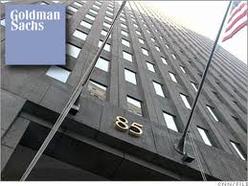$22mn fine levied on Goldman for analyst huddles
Two regulatory agencies - the Financial Industry Regulatory Authority (FINRA) and the Securities and Exchange Commission (SEC) Thursday fined Wall Street bank Goldman, Sachs Co. $22 million for failure to have checks in place to prevent analysts from sharing trading ideas with the firm's traders, who interface with clients and sometimes equity salespersons.

Pursuant to the settlements, Goldman will pay $11 million each to FINRA and the SEC.
Brad Bennett, FINRA Executive Vice President and Chief of Enforcement, said, "Goldman's trading huddles created an environment of heightened risk in which material non-public information concerning analysts' published research could be disclosed to its clients. In addition, the firm did not have an adequate system in place to monitor client trading in advance of changes in its published research."
In 2006, Goldman established a business process known as "trading huddles" to allow research analysts to meet on a weekly basis to share trading ideas with the firm's traders, who interfaced with clients, and, on occasion, equity salespersons.
The SEC said that the "huddles" practice took place between 2006 and 2011, and involved sales personnel. At the meetings, analysts discussed short-term trading ideas and traders discussed their views on the markets.
The SEC noted that in 2007 the New York investment giant began a program known as the "Asymmetric Service Initiative" where analysts shared information and trading ideas from the meetings with some investor clients.
Clients were not restricted from participating directly in the trading huddles and had access to the huddle information through research analysts' calls to certain of the firm's high priority clients. These calls included discussions of the analysts' "most interesting and actionable ideas."
Trading huddles created the significant risk that analysts would disclose material non-public information, including, among other things, previews of ratings changes or changes to conviction list status, the regulator stated.
"Despite this risk, Goldman did not have adequate controls in place to monitor communications in trading huddles and by analysts after the huddles," the FINRA statement said.
Goldman did not adequately review discussions in the trading huddles to determine whether an equity research analyst may have previewed an upcoming ratings change, FINRA has charged.
It cites the instance of an analyst of a particular company in a trading huddle in 2008 who stated that "we expect companies with consumer and small business exposure to be under pressure in the current environment, including [the company]."
The next day, the analyst sought and received approval to downgrade the company from "neutral" to "sell," and to add the stock to Goldman's conviction sell list. Goldman published an equity research report making these changes that same day.
SEC Director of Enforcement Robert Khuzami pointed, "Despite being on notice from the SEC about the importance of such controls, Goldman failed to implement policies and procedures that adequately controlled the risk that research analysts could preview upcoming ratings changes with select traders and clients."
The SEC noted that in 2003 Goldman paid a $5 million penalty to settle charges that, among other violations, it failed to set up and enforce written policies to misuse material non-public information obtained from outside consultants about U.S. Treasury 30-year bonds.
According to the SEC, Goldman agreed to review and write new policies and procedures "consistent with the findings of the order."
In concluding this settlement, Goldman neither admitted nor denied the charges, but consented to the entry of the SEC's and FINRA's findings and admitted to certain facts that were part of a prior settlement with the state of Massachusetts.
Source: Latin America News.Net
- 721 reads
Human Rights
Fostering a More Humane World: The 28th Eurasian Economic Summi

Conscience, Hope, and Action: Keys to Global Peace and Sustainability

Ringing FOWPAL’s Peace Bell for the World:Nobel Peace Prize Laureates’ Visions and Actions

Protecting the World’s Cultural Diversity for a Sustainable Future

Puppet Show I International Friendship Day 2020

